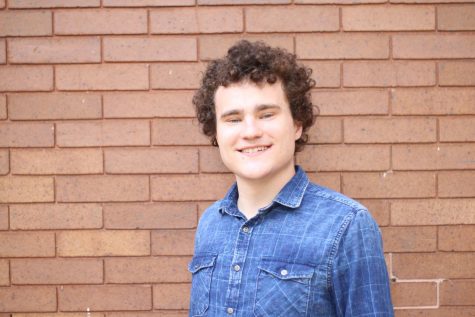Barnhouse Journal offers poetry for everyone
September 6, 2019
In the spring of 2018, Kevin Latimer sat at a writing workshop, frustrated. Few people at the table looked like him, and few shared his background from one of the poorest parts of Cleveland.
That same year, Latimer and his friend Jason Harris founded a literary space of their own in response: Barnhouse Journal. The Cleveland-based literary publication has published two print issues and receives submissions from across the globe, including Pakistan, Australia and Algeria.
“We just want to be something that brings more voices to the table,” said Latimer. “The publishing world tends to be very male and white-dominated. We’re two black men, and we have staff who are trans and a lot of women. We’re trying to be that alternative.”
The duo encourages writers to experiment with the form of poetry itself and its presentation. Latimer and Harris have launched a new series of videos, “People Reading Poetry in Strange Places,” where poets perform their works in trash cans and other unorthodox locations.
“One of the issues that led us to Barnhouse is this idea of class and who has access to literature,” said Harris, co-editor of Barnhouse. “Poetry in strange places undercuts that obstacle, so you no longer have to sit in a four-year university to hear poetry you enjoy.”
The duo’s attempt to reach people who may otherwise not read poetry extends to their choice of venues along with their multimedia projects. Barnhouse has more public readings in bars than book stores.
“Our mission is Barnhouse for everyone,” said Harris. “We want to be the literary journal that creates and holds space for different types of voices.”
Along with poetry, Barnhouse publishes works of fiction and nonfiction. “Most of all, we’re looking for good writing,” said Latimer, “something that tells us something about humanity that we haven’t heard before, or if we have heard it before, tells us about it in a different way.”
Harris said one thing that shocked him about going through drafts is how certain themes seem to appear constantly in people’s submissions. When going over submissions for Cleveland Drafts, a literary bar crawl where bookstores, bars and performing arts venues team up to showcase the talent of local authors, he noticed that blood and death popped up again and again.
“In this collection, I read for drafts. A lot of them had to due with illnesses in the blood and what happens after death,” said Harris. “It was interesting to see so many types of writing from different writers from different stages of life find a way to be on the same path.”
Harris is currently working on a collection of poems about climate change and living in the Anthropocene, the geological era where humans have become the dominant force on the planet.
One poem from that upcoming collection, “Blue,” uses a memory of hitting a bird while driving back from a literary workshop as a metaphor for causing harm to the environment.
“Cruise control made it easy, my feet had nothing to do with it,” Harris read from his collection, “The sky was blue. The sky was blue. You couldn’t see it, but we were crashing.”
Latimer is working on a manuscript called “Dispatches from the Near End of the World,” which also deals with climate change. The poems start by using normal language, but the prose gets more fragmented as language is abandoned, morphing into choppy sentences, whiteouts and strikeouts.
Latimer’s poem “Originally a Space Opera,” combines the ideas of space as a utopia, violence, the murder of Tamir Rice and other incidents of police shootings.
“Those shots, those shots, those shots those shots,” writes Latimer. The phrase appears 137 times in the work, a reference to 137 shots fired by Cleveland police at a car in a school parking lot occupied by two unarmed black men at the end of a car chase.
Submissions to Barnhouse are free and open to anyone. The second issue of Barnhouse is available at local independent bookstores like Appletree in Cleveland Heights, and Mac’s Backs Books in Coventry.
“Cleveland is a very interesting place after the fall of industry,” said Latimer. “People talk down on Cleveland a lot and we try to be like, no Cleveland is cool and literature is cool. It’s not just fifty old white men in a room.”
This interview was originally broadcast on WRUW FM 91.1 Cleveland on Voices and Choices, a public affairs show airing every Tuesday from 6-7 p.m.



